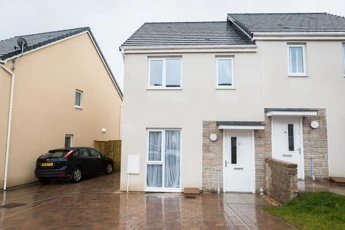Whenever a mortgage is involved, we need to consider what its loan-to-value (LTV) ratio is. Not sure what that means? You’re in the right place. Keep reading to learn more about LTVs and what they mean for your mortgage.
Understanding your LTV
Lenders use the LTV to measure the amount they’re financing in relation to the property’s value. It’s affected by how much you contribute upfront to the mortgage, most likely from your deposit.
You will see it expressed as a percentage, and it is calculated by dividing the loan amount by the property’s appraised value (or the purchase price). For example:
- You buy a house valued at £200,00 and put down a £40,000 deposit. This means you need a loan of £160,000, so your LTV would be 80%.
- If you buy a house valued at £150,000 and put down a 5% deposit, which is £7,500, your LTV would be 95%
- You could also put down £150,000 on a property valued at £300,000. This means your LTV would be 50%
Why is your LTV ratio important?
LTV plays a vital role in mortgage lending decisions, as it gives the lender an idea of the level of risk associated with the loan. The higher the LTV, the higher the loan amount relative to the property’s value, which lenders typically see as riskier.
While lower LTVs are generally preferred, it is more than possible to get a mortgage with a high LTV.
High LTV mortgages
These are LTV ratios of 85% or above. We see them the most in first time buyers and those with limited savings, as it allows them to secure a mortgage with a smaller deposit. Getting a high LTV mortgage does mean that your credit score should be as high as possible, as without a significant deposit, your lender will have to rely more on your credit score to assess your reliability.
95% mortgages
Many lenders will offer 95% mortgages to those who haven’t saved enough for a big deposit and it’s worth exploring whether you could be eligible for a 95% mortgage. We have an article that covers this in depth so be sure to check that out!
Shared Ownership
You could consider Shared Ownership if you’re struggling to get on the property ladder with a small deposit. With Shared Ownership, you’ll usually buy 25-75% of the property and pay rent on the rest. You can buy further shares in the future. Read more about it in our expert advice article.

How we can help
High LTV mortgages can provide a gateway to homeownership for many aspiring buyers in the UK. For those who are already homeowners, the equity in your home impacts your LTV ratios, and the more equity you have, the lower your LTV could be.
Our expert advisers can help you find a mortgage that suits your needs, whether it’s a 95% mortgage or a 30% one. We’ll listen to your long-term financial goals and help you make informed decisions about your mortgage.
Get in touch with us and we can discuss and explore your options.
Important information
Your home may be repossessed if you do not keep up repayments on your mortgage.
There may be a fee for mortgage advice. The actual amount you pay will depend on your circumstances. The fee is up to 1% but a typical fee is 0.3% of the amount borrowed.







